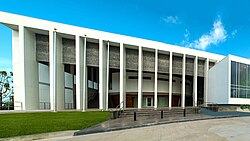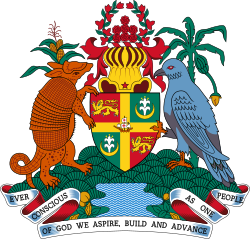Parliament of Grenada
 From Wikipedia - Reading time: 11 min
From Wikipedia - Reading time: 11 min
This article needs additional citations for verification. (September 2014) |
Parliament of Grenada | |
|---|---|
| 11th Parliament | |
 | |
| Type | |
| Type | |
| Houses | Senate House of Representatives |
| History | |
| Founded | 1967 |
| Leadership | |
Charles III since 8 September 2022 | |
Cécile La Grenade since 7 May 2013 | |
Leo Cato since 31 August 2022 | |
| Structure | |
| Seats |
|
 | |
Senate political groups | HM Government
|
 | |
House of Representatives political groups | HM Government
Presiding officer
|
| Elections | |
| Appointed by the Governor-General on advice of the Prime Minister (10) and Opposition Leader (3) | |
| First-past-the-post | |
Last House of Representatives election | 23 June 2022 |
| Meeting place | |
 | |
| New Houses of Parliament St. George's Grenada | |
| Website | |
| grenadaparliament.gd | |
 |
|---|
| Administrative divisions (parishes) |
12°03′14″N 61°44′43″W / 12.05384°N 61.74536°W
The Parliament of Grenada is the bicameral legislative body of Grenada. It is composed of the monarch and two chambers: the Senate and the House of Representatives. It operates from the New Houses of Parliament in St. George's.
Structure
[edit]Parliament consists of the King, represented by the Governor-General, the Senate and the House of Representatives. The Governor-General summons Parliament, brings its session to an end by prorogation, and formally assents to every bill before it can become law. In practice, they exercise all these powers on the advice of the Prime Minister and the Cabinet.
The passage of legislation depends on the participation of all three component parts of Parliament. A bill must be agreed to by both Houses and receive the Royal Assent before it can become an Act of Parliament. The powers of the Senate and the House of Representatives are constitutionally equal except that financial legislation may not be introduced in the Senate.
All Senators are appointed by the Governor-General on the advice of the Prime Minister of Grenada and the Leader of the Opposition.
The House of Representatives is directly elected by the people, and although by tradition the Senate is the Upper House and the House of Representatives is the Lower House, it is the House of Representatives which plays the predominant part in the parliamentary system.
The Parliament of Grenada has its origin in the colonial Legislative Council but first came into being in its modern form in 1967, when Grenada became an associated state of the United Kingdom, and continued after independence in 1974. Parliament follows the Westminster system and is closely modelled upon the British Parliament.
Functions of the Senate
[edit]- To act as a house of review with responsibility for expressing second opinion in relation to legislative and other proposals initiated in the House of Representatives.
- To ensure proper consideration of all legislation.
- To provide adequate scrutiny of financial measures.
- To initiate non-financial legislation as the Senate sees fit: the Senate’s capacity to initiate proposed legislation effectively means that Parliament is not confined in its opportunities for considering public issues in a legislative context to those matters covered by bills brought forward by the executive.
- To probe and check the administration of laws and to keep itself informed, and to insist on ministerial accountability for the administration of the Government.
- To provide effective scrutiny of Government and enable adequate expression of debate about policy and government programs. As a parliamentary forum, the Senate is one place where a government can be, of right, questioned and obliged to answer.
All bills must be passed by the Senate before they can become law, and it has the constitutional right to reject any bill and keep on rejecting it for up to 6 months. It can also amend any bill, although it cannot initiate or increase the amount of any bill dealing with taxation or expenditure.
Monarch
[edit]The King personifies the State. In law, he is the head of the Executive and an integral part of the legislature. In practice, all the King’s functions are exercised by the Governor-General, who in turn exercises all these powers on the advice of the Prime Minister and the Cabinet.
House of Representatives
[edit]The House of Representatives has 16 members: 15 elected for a five-year term in single-seat constituencies, and a speaker.[1][2] The elections are by the first-past-the-post system. The National Democratic Congress currently holds a majority with 10 seats, while the opposition New National Party holds 4 seat in the House of Representatives, with 1 seat being held by an independent former of the NNP. The NDC’s majority of 9 from the 2022 election was increased following the defection of one NNP member of parliament in May 2023.
The House of Representatives is the focal point of parliamentary activity and public attention, the grand forum of the nation, where major national and international issues are debated; where the Prime Minister and the Leader of the Opposition may be seen in regular confrontation; where Cabinet Ministers defend the policies and conduct of their departments; where the nation’s business in freely and openly transacted, all that is said and done being faithfully recorded.
Parliament makes the laws and the House of Representatives plays the predominant part in making them. Any member can introduce bills, except bills involving expenditure or taxation, which can only be introduced by the government. Since the responsibilities of government now extend into almost every sphere of activity, and since most government action involves spending money (and raising it by taxes, fees, loans, and so forth), most of the time of the House is spent on Government Bills.
Every bill must pass both Houses and receive the Royal Assent before it becomes law. Assent is signified by the Governor General.
By law a general election must be held at least once every five years. However, Parliament may be dissolved and an election called before the statutory period has elapsed, and this is what normally happens. The power to dissolve Parliament is a royal prerogative exercised by the Governor General, normally on the advice of the Prime Minister.
The House of Representatives was modeled on the British, and even now, in any matter of procedure not provided for by its own rules and practices, the rules and practices of the British House of Commons are followed.
Senate
[edit]The Senate has 13 appointed members. Ten are appointed on the advice of the Prime Minister, with three of them being appointed "after he has consulted the organizations or interests which he considers the Senators should be selected to represent," and three are appointed on advice of the Leader of the Opposition. The National Democratic Congress has 7 seats in the senate, while the New National Party has 3. The remaining 3 seats are held by independents representing the labour movement, farmers and fishers, and the business community.
Meeting place
[edit]Parliament meets at the New Houses of Parliament in St. George's. Prior to the building’s opening in 2018 it had met in the Grenada Trade Centre since 2004, following the destruction of York House by Hurricane Ivan. York House had previously housed Parliament and the preceding Legislative Council since 1801.
Despite being a bicameral legislature, the parliament building has only one chamber. Both the House and the Senate utilise the same chamber for sittings on different days.
See also
[edit]- Politics of Grenada
- List of legislatures by country
- House of Representatives of Grenada
- Senate of Grenada
- List of speakers of the House of Representatives of Grenada
- List of presidents of the Senate of Grenada
- Leader of the Opposition (Grenada)
References
[edit]- ^ "Official website". Archived from the original on 2018-06-04. Retrieved 2013-08-26.
- ^ "Country Profile: Grenada". IFES Election Guide. Retrieved 2022-06-29.
 KSF
KSF